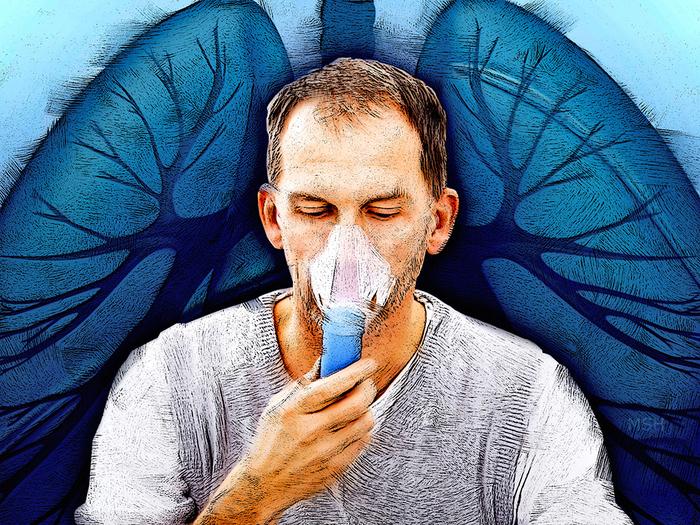Reversing the effects of pulmonary fibrosis

Yale University researchers are studying a potential new treatment that reverses the effects of pulmonary fibrosis. Credit: Michael Helfenbein illustration.
The treatment uses a microRNA mimic, miR-29, which is delivered to lung tissue intravenously. In mouse models, miR-29 not only blocked pulmonary fibrosis, it reversed fibrosis after several days.
The findings were published Sept. 19 in the journal EMBO Molecular Medicine.
“The mimic, when injected into the blood, goes to the lung and it has a sustained effect. We are very impressed that it can reverse fibrosis, not only prevent it,” said Naftali Kaminski, M.D., a professor at Yale School of Medicine and section chief of pulmonary, critical care, and sleep medicine. He is a corresponding author of the study.
The research is a collaboration between Yale and miRagen Therapeutics, a pharmaceutical company based in Boulder, Colo. The company had developed miR-29 previously as a possible therapy for cardiac disease.
Kaminski, whose group pioneered research in microRNA in lung fibrosis, saw the potential for use of miR-29 in pulmonary fibrosis, as did Eva van Rooij, the scientist who discovered the role for miR-29 in cardiac fibrosis and is a senior co-author on the paper.
“I'm particularly excited about working with this microRNA,” said van Rooij, who now is at the Hubrecht Institute in the Netherlands. “All evidence points to it being a master regulator of fibrosis.”
The next step, Kaminski said, will be to begin evaluating miR-29 as a therapeutic for human Idiopathic Pulmonary Fibrosis (IPF).
Once considered a rare disease, IPF now affects more than 200,000 people in the United States, where about 30,000 people die from IPF every year. The median survival from diagnosis is 3-5 years, and despite recent promising advances there is no intervention that reverses the disease.
Media Contact
More Information:
http://www.yale.edu/All latest news from the category: Health and Medicine
This subject area encompasses research and studies in the field of human medicine.
Among the wide-ranging list of topics covered here are anesthesiology, anatomy, surgery, human genetics, hygiene and environmental medicine, internal medicine, neurology, pharmacology, physiology, urology and dental medicine.
Newest articles

Properties of new materials for microchips
… can now be measured well. Reseachers of Delft University of Technology demonstrated measuring performance properties of ultrathin silicon membranes. Making ever smaller and more powerful chips requires new ultrathin…

Floating solar’s potential
… to support sustainable development by addressing climate, water, and energy goals holistically. A new study published this week in Nature Energy raises the potential for floating solar photovoltaics (FPV)…

Skyrmions move at record speeds
… a step towards the computing of the future. An international research team led by scientists from the CNRS1 has discovered that the magnetic nanobubbles2 known as skyrmions can be…





















